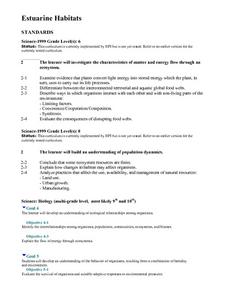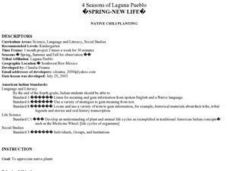Curated OER
Rainforest Deforestation and the Water Cycle
Students create terrariums (mini rainforests). They observe and discuss the life processes that occur in their terrariums and how changes in these processes affect the plants and organisms inside. They collect and graph data and present...
Curated OER
Estuarine Habitats
Sixth graders study the important habitats, flora, fauna, and physical factors of coastal habitats. They compare the aquatic habitats to terrestrial habitats by researching and completing tables with the information.
Curated OER
Diversity of Life: Pathogens
Students research bacteria and viruses that carry pathogens. In this diversity lesson, students examine how pathogens spread disease through bacteria and viruses. Students write a report on disease caused by bacteria or virus including...
University of Southern California
Mastering Microbes
Small but mighty! Learners explore the role of microbes in a healthy ecosystem. An engaging instructional activity asks pupils to design an aquaponics system that demonstrates that healthy microbes are necessary to maintain the ecosystem.
Curated OER
Where Does Food Come From?
Distinguish between food and non-food items. Recognize that food is obtained from both plant and animal sources. Identify sources for some common animal foods then construct a simple food path from the farm to the consumer.
Dr. Panda
Dr. Panda's Veggie Garden
Friends arrive at the farm and aspiring agronomists help the farmer to grow what the friends want. With adorable animation and charming background music, little ones practice virtual gardening and farming while developing cognitive...
K12 Reader
Ecosystems
Examine how living and non-living things work together in a reading passage about ecosystems. Class members read the text and then respond to five response questions that relate specifically to the content of the passage.
American Museum of Natural History
Make a Terrarium
Scholars read a brief overview of what a terrarium is and how it creates the greenhouse effect, then click on a link to discover the materials and 10 steps they need to build their own.
Curated OER
Photo Synthesis and Transpiration
Students germinate pea seeds and plant the seeds. They experiment with different amounts of light and darkness on the plant growth.
Virginia Department of Education
Cell Parts
What do a bird, an egg, a rabbit, and a toad all have in common? This fun-filled resource explains the similarities and differences between cells and how all cells are similar, yet all are different. Learners begin by depicting a...
K-State Research and Extensions
Water
How are maps like fish? They both have scales. The chapter includes six different activities at three different levels. Scholars complete activities using natural resources, learn how to read a map, see how to make a compass rosette,...
Curated OER
The Compost Bucket
Students recognize that plants and soils have a close relationship. They view a photo essay on the common practice and natural process of composting. Afterwards, they observe the process of plant decay over the course of several days.
Curated OER
Dissolved Oxygen Lesson
Students investigate what dissolved oxygen is and why it is important to aquatic life and what factors influence levels of dissolved oxygen in a lake. They study how to use MS Excel to make charts to show trends and correlations.
Curated OER
Making Community Measurements: Which Plant Part?
Students identify a plant in a given community and make a variety of measurements. They determine how a plant meets its basic needs. In addition to identifying plant parts, they observe seasonal change and compare plants within a community.
Curated OER
Native Chili Planting
Students discover the process of planting chili. After comparing two types of seeds students plant and with the use of a digital camera, record the seed progress. When ready for transplant, students take young plants to a retirement...
Curated OER
What's Happening to Our Caterpillars?
Seventh graders participate in a lesson making observations of caterpillars. They identify different changes in the life cycle of a caterpillar and also understand the final result of the life cycle ending.
Curated OER
Cleansing, Sparkling Koos
Pupils explore the importance of water conservation and investigate how plants clean water.
Curated OER
Ride the Wild Leaf Cycle
Fourth graders explore plant life by completing an Internet activity. In this botany lesson, 4th graders identify the types of plants that grow locally and the different soils they utilize to survive. Students read assigned text about...
Curated OER
Using the Scientific Method to Determine Which Conditions Best Favor Plant Growth
Seventh graders examine how the environment can affect biological processes. They identify the best conditions for the germination of bean seeds. They record and analyze their data. They write about their observations in an essay.
Curated OER
Photosynthesis Cookies
Students identify photosynthesis as a process through which organisms make their own food. They practice the process for writing the formula for the photosynthesis equation.
Students describe how the processes of photosynthesis and...
Curated OER
Leaves and Photosynthesis
In this science worksheet, students read detailed information about green plants and the photosynthesis process. In this fill in the blank and true and false worksheet, students answer twelve questions.
Curated OER
Photosynthesis and Cell Respiration
Fifth graders participate in scientific inquires regarding the concepts of photosynthesis and cell respiration. In this photosynthesis and cell respiration lesson, 5th graders describe the process of photosynthesis with relation to...
Curated OER
Photosynthesis
High schoolers conduct a variety of experiments on photosynthesis. In this biology instructional activity, students identify the factors required for the process to occur. They perform computerized experiments to test the amount of...
Curated OER
Case of the Missing Pumpkin
Learners explore the process of decomposition. In this science lesson, students carve a pumpkin and observe as it decomposes. Learners compare the changes to an uncarved pumpkin. Students write about the disappearing pumpkin.

























